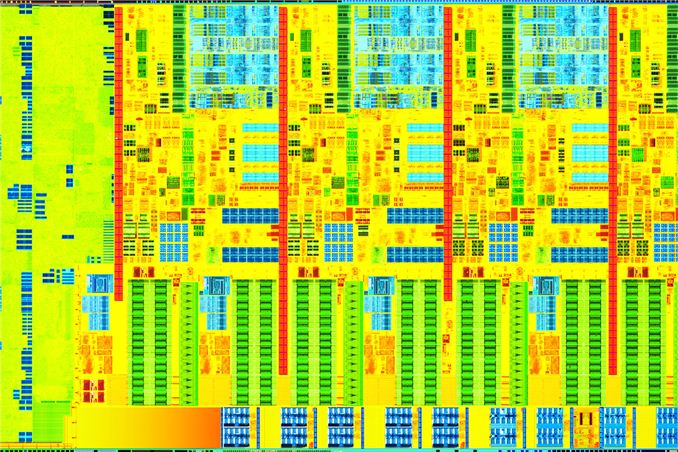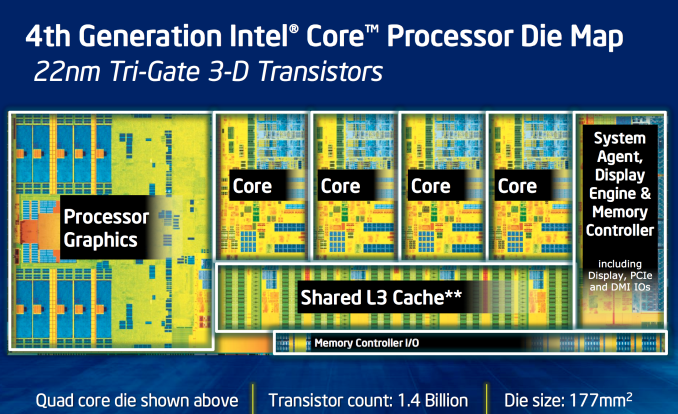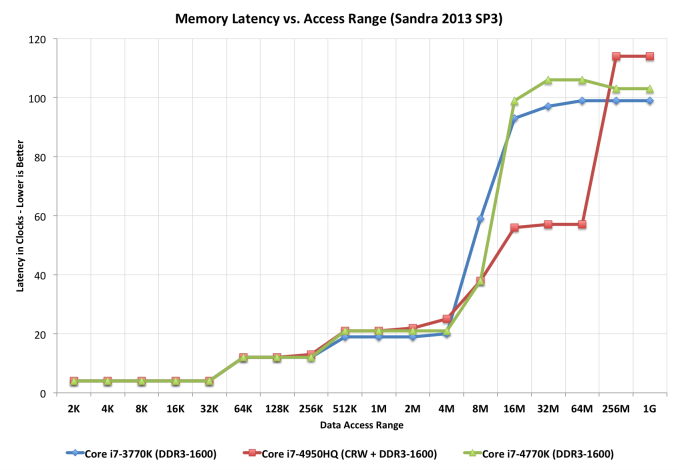The Haswell Review: Intel Core i7-4770K & i5-4670K Tested
by Anand Lal Shimpi on June 1, 2013 10:00 AM EST
This is a very volatile time for Intel. In an ARM-less vacuum, Intel’s Haswell architecture would likely be the most amazing thing to happen to the tech industry in years. In mobile Haswell is slated to bring about the single largest improvement in battery life in Intel history. In graphics, Haswell completely redefines the expectations for processor graphics. There are even some versions that come with an on-package 128MB L4 cache. And on the desktop, Haswell is the epitome of polish and evolution of the Core microprocessor architecture. Everything is better, faster and more efficient.
There’s very little to complain about with Haswell. Sure, the days of insane overclocks without touching voltage knobs are long gone. With any mobile-first, power optimized architecture, any excess frequency at default voltages is viewed as wasted power. So Haswell won’t overclock any better than Ivy Bridge, at least without exotic cooling.
You could also complain that, for a tock, the CPU performance gains aren’t large enough. Intel promised 5 - 15% gains over Ivy Bridge at the same frequencies, and most of my tests agree with that. It’s still forward progress, without substantial increases in power consumption, but it’s not revolutionary. We compare the rest of the industry to Intel’s excellent single threaded performance and generally come away disappointed. The downside to being on the top is that virtually all improvements appear incremental.
The fact of the matter is that the most exciting implementations of Haswell exist outside of the desktop parts. Big gains in battery life, power consumption and even a broadening of the types of form factors the Core family of processors will fit into all apply elsewhere. Over the coming weeks and months we’ll be seeing lots of that, but today, at least in this article, the focus is on the desktop.
Haswell CPU Architecture Recap
Haswell is Intel’s second 22nm microprocessor architecture, a tock in Intel’s nomenclature. I went through a deep dive on Haswell’s Architecture late last year after IDF, but I’ll offer a brief summary here.
At the front end of the pipeline, Haswell improved branch prediction. It’s the execution engine where Intel spent most of its time however. Intel significantly increased the sizes of buffers and datastructures within the CPU core. The out-of-order window grew, to feed an even more parallel set of execution resources.
Intel added two new execution ports (8 vs 6), a first since the introduction of the Core microarchitecture back in 2006.
On the ISA side, Intel added support for AVX2, which includes an FMA operation that considerably increases FP throughput of the machine. With a doubling of peak FP throughput, Intel doubled L1 cache bandwidth to feed the beast. Intel also added support for transactional memory instructions (TSX) on some Haswell SKUs.
The L3 cache is now back on its own power/frequency plane, although most of the time it seems to run in lockstep with the CPU cores. There appears to be a 2 - 3 cycle access penalty as a result of decoupling the L3 cache.


















210 Comments
View All Comments
JDG1980 - Saturday, June 1, 2013 - link
Those tests you linked are purely synthetic benchmarks. Has anyone found a significant real-world application where Haswell is slower than SB/IB at the same clock speed?krumme - Saturday, June 1, 2013 - link
Has anyone found a significal real-world application where Haswell matter?smilingcrow - Saturday, June 1, 2013 - link
Has anyone found a significant real-world comment from you that matters?rupert3k - Saturday, June 1, 2013 - link
*high fives*Aditya211935 - Sunday, June 2, 2013 - link
http://www.techoftomorrow.com/2013/pc/intel-haswel...This One is pretty nice.
Altough the list of games given there is a bit shallow but still it gives you a general idea.
jeffkibuule - Saturday, June 1, 2013 - link
Haswell isn't just about the CPU, it's about the entire platform of chips, even the tiny ones on the motherboard no one really cares about. And I'm not sure what you were expecting in terms of performance gains, as there isn't any competition in the desktop arena for it to be worth pushing out 20-25% gains (and certainly not on a yearly basis).As far as active power goes, the entire point of a modern CPU architecture is to "hurry up and go to sleep (HUGS)". Faster you go to idle and the better idle performance you have, the better battery life you get because lets face it, unless you're encoding a video or playing a game, your CPU spends most of its idling doing nothing.
B3an - Saturday, June 1, 2013 - link
You're right. If anyone is to be blamed for the slight performance increase of Haswell, it's AMD. If AMD could actually compete on performance we would be seeing more gains with Haswell, and maybe FINALLY more than 4 cores on mainstream Intel platforms.DeadlyRicochet - Tuesday, June 4, 2013 - link
And I wonder how successful AMD would have been if Intel never stole their revenue (when AMD chips were faster than Intel, around 2006) by making under the table deals with OEMs to use Intel only CPUs.deepblue08 - Saturday, June 1, 2013 - link
I disagree somewhat. Especially with the fact that you think idle power consumption is unimportant. Keep in mind, that at least half of the time, when you are working, browsing the net, your cpu is in fact idle. So an improvement in idle performance consumption is a big deal imo.Hector2 - Saturday, June 1, 2013 - link
You've got it all wrong. Haswell won't be going up against ARM in tablets. Don't look for it in smartphones either ! LOL A Haswell i7 is serious overkill for those markets. ARM won't be getting into the serious laptop & PC market soon either --- they just can't compete well with Intel there. Intel is targeting their smaller & less power-hungry Atoms for the phone & tablet markets (surely you know this ?) that are driven by low power requirements. The press just leaked that Samsung's new Galaxy Tab 3 will have dual core Clover Trail+ Atoms